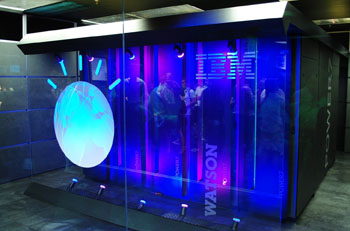IBM Watson to Improve Cancer Treatment in China
|
By HospiMedica International staff writers Posted on 24 Aug 2016 |

Image: The IBM Watson healthcare platform (Photo courtesy of IBM).
Twenty-one hospitals in China will adopt the IBM (Armonk, NY, USA) Watson Healthcare platform as part of a multiyear push toward personalized and evidence-based cancer treatment.
IBM will work with healthcare services organization Hangzhou Cognitive Care (Beijing, China) to introduce Watson for Oncology, a cognitive computing platform for physicians developed by Memorial Sloan Kettering Cancer Center (MSKCC, New York, NY, USA) to deliver personalized, evidence-based cancer treatment options. The initial 21-hospital introduction is part of a far-reaching, multi-year partnership through which Hangzhou Cognitive Care will introduce Watson for Oncology to hospitals across China.
Watson for Oncology will help doctors customize treatments by analyzing massive volumes of medical literature to select individualized treatments by quickly summarizing patient records and scoring and ranking them. It works from a bank of more than 300 medical journals, more than 200 textbooks, and close to 15 million pages of text, as well as peer-reviewed studies and clinical guidelines to offer recommendations on possible treatment options. And its machine learning capacity means that it will only improve over time.
Hangzhou Cognitive Care will support the Watson rollout in China by localizing Watson for Oncology, offering translation support so that insights, such as drug labels and treatment guidelines, will be available to customers and patients in Chinese. Cognitive Care will also localize dosing based on Chinese medical guidelines, and will build on its regional network of teleconsultation system service providers tapping into their knowledge of the region, the medical community, and the health needs of the population.
“IBM is committed to working with Cognitive Care as the first mover in China to bring Watson Health technologies into this market,” said Deborah DiSanzo, general manager for IBM Watson Health. “Health leaders in Asia-Pacific are leading the way globally in advancing cancer care. The 21 hospitals in China that will adopt the Watson for Oncology offering join world-class facilities that are offering the power of Watson to their physicians and the adoption of Watson in China is indicative of the momentum we are seeing among health professionals worldwide for IBM’s unique cognitive computing platform.”
“Hangzhou Cognitive Care is eager to bring IBM’s Watson for Oncology to reach every oncologist in China we possibly can,” said Zhen Tu, CEO of Hangzhou Cognitive Care. “Watson has the power to transform how doctors battle cancer in China and around the world, providing physicians with insights regarding treatment options that help them customize therapeutic recommendations specific to each individual, based on a patient’s specific needs.”
IBM has established a number of partnerships around its Watson Health division, notably teaming up with the American Diabetes Association to apply cognitive computing to clinical and research data, and deploying the Watson Genomic Analysis cloud-based service to help 14 hospitals across the United States provide personalized cancer treatment.
Related Links:
IBM
Memorial Sloan Kettering Cancer Center
IBM will work with healthcare services organization Hangzhou Cognitive Care (Beijing, China) to introduce Watson for Oncology, a cognitive computing platform for physicians developed by Memorial Sloan Kettering Cancer Center (MSKCC, New York, NY, USA) to deliver personalized, evidence-based cancer treatment options. The initial 21-hospital introduction is part of a far-reaching, multi-year partnership through which Hangzhou Cognitive Care will introduce Watson for Oncology to hospitals across China.
Watson for Oncology will help doctors customize treatments by analyzing massive volumes of medical literature to select individualized treatments by quickly summarizing patient records and scoring and ranking them. It works from a bank of more than 300 medical journals, more than 200 textbooks, and close to 15 million pages of text, as well as peer-reviewed studies and clinical guidelines to offer recommendations on possible treatment options. And its machine learning capacity means that it will only improve over time.
Hangzhou Cognitive Care will support the Watson rollout in China by localizing Watson for Oncology, offering translation support so that insights, such as drug labels and treatment guidelines, will be available to customers and patients in Chinese. Cognitive Care will also localize dosing based on Chinese medical guidelines, and will build on its regional network of teleconsultation system service providers tapping into their knowledge of the region, the medical community, and the health needs of the population.
“IBM is committed to working with Cognitive Care as the first mover in China to bring Watson Health technologies into this market,” said Deborah DiSanzo, general manager for IBM Watson Health. “Health leaders in Asia-Pacific are leading the way globally in advancing cancer care. The 21 hospitals in China that will adopt the Watson for Oncology offering join world-class facilities that are offering the power of Watson to their physicians and the adoption of Watson in China is indicative of the momentum we are seeing among health professionals worldwide for IBM’s unique cognitive computing platform.”
“Hangzhou Cognitive Care is eager to bring IBM’s Watson for Oncology to reach every oncologist in China we possibly can,” said Zhen Tu, CEO of Hangzhou Cognitive Care. “Watson has the power to transform how doctors battle cancer in China and around the world, providing physicians with insights regarding treatment options that help them customize therapeutic recommendations specific to each individual, based on a patient’s specific needs.”
IBM has established a number of partnerships around its Watson Health division, notably teaming up with the American Diabetes Association to apply cognitive computing to clinical and research data, and deploying the Watson Genomic Analysis cloud-based service to help 14 hospitals across the United States provide personalized cancer treatment.
Related Links:
IBM
Memorial Sloan Kettering Cancer Center
Latest Hospital News News
- Nurse Tracking System Improves Hospital Workflow
- New Children’s Hospital Transforms California Healthcare
- Noisy Hospitals Face Threat of Decreased Federal Compensation
- Orthopedics Centre of Excellence Planned for Guy’s Hospital
- Research Suggests Avoidance of Low-Value Surgical Procedures
- U.S. Federal Readmission Fines Linked to Higher Mortality
- Columbia China to Build New Hospital in Jiaxing
- Dubai Debuts Second Robotic Pharmacy Service
- Seattle Hospital Network Shifts Away from Overlapping Surgeries
- ACC to Launch Valvular Heart Disease Program in China
- Mortality Rates Lower at Major Teaching Hospitals
- South Australia to Inaugurate Upscale Hospital
- Raffles to Launch Second Hospital Project in China
- Research Center Tackles Antimicrobial Drugs Challenge
- Miami Cardiac & Vascular Institute Completes Expansion Project
- Hospital Antibiotic Policies Improve Prescription Practices
Channels
Artificial Intelligence
view channel
AI-Powered Algorithm to Revolutionize Detection of Atrial Fibrillation
Atrial fibrillation (AFib), a condition characterized by an irregular and often rapid heart rate, is linked to increased risks of stroke and heart failure. This is because the irregular heartbeat in AFib... Read more
AI Diagnostic Tool Accurately Detects Valvular Disorders Often Missed by Doctors
Doctors generally use stethoscopes to listen for the characteristic lub-dub sounds made by heart valves opening and closing. They also listen for less prominent sounds that indicate problems with these valves.... Read moreCritical Care
view channel
Wheeze-Counting Wearable Device Monitors Patient's Breathing In Real Time
Lung diseases like asthma, chronic obstructive pulmonary disease (COPD), lung cancer, bronchitis, and infections such as pneumonia, rank among the leading causes of death worldwide. Traditionally, medical... Read more
Wearable Multiplex Biosensors Could Revolutionize COPD Management
Chronic obstructive pulmonary disease (COPD) ranks as the third leading cause of death worldwide. Acute exacerbations of COPD (AECOPD), which are often triggered by lung infections, accelerate the disease's... Read moreSurgical Techniques
view channel
Flexible Microdisplay Visualizes Brain Activity in Real-Time To Guide Neurosurgeons
During brain surgery, neurosurgeons need to identify and preserve regions responsible for critical functions while removing harmful tissue. Traditionally, neurosurgeons rely on a team of electrophysiologists,... Read more.jpg)
Next-Gen Computer Assisted Vacuum Thrombectomy Technology Rapidly Removes Blood Clots
Pulmonary embolism (PE) occurs when a blood clot blocks one of the arteries in the lungs. Often, these clots originate from the leg or another part of the body, a condition known as deep vein thrombosis,... Read more
Hydrogel-Based Miniaturized Electric Generators to Power Biomedical Devices
The development of engineered devices that can harvest and convert the mechanical motion of the human body into electricity is essential for powering bioelectronic devices. This mechanoelectrical energy... Read moreWearable Technology Monitors and Analyzes Surgeons' Posture during Long Surgical Procedures
The physical strain associated with the static postures maintained by neurosurgeons during long operations can lead to fatigue and musculoskeletal problems. An objective assessment of surgical ergonomics... Read morePatient Care
view channel
Surgical Capacity Optimization Solution Helps Hospitals Boost OR Utilization
An innovative solution has the capability to transform surgical capacity utilization by targeting the root cause of surgical block time inefficiencies. Fujitsu Limited’s (Tokyo, Japan) Surgical Capacity... Read more
Game-Changing Innovation in Surgical Instrument Sterilization Significantly Improves OR Throughput
A groundbreaking innovation enables hospitals to significantly improve instrument processing time and throughput in operating rooms (ORs) and sterile processing departments. Turbett Surgical, Inc.... Read more
Next Gen ICU Bed to Help Address Complex Critical Care Needs
As the critical care environment becomes increasingly demanding and complex due to evolving hospital needs, there is a pressing requirement for innovations that can facilitate patient recovery.... Read moreGroundbreaking AI-Powered UV-C Disinfection Technology Redefines Infection Control Landscape
Healthcare-associated infection (HCAI) is a widespread complication in healthcare management, posing a significant health risk due to its potential to increase patient morbidity and mortality, prolong... Read moreHealth IT
view channel
Machine Learning Model Improves Mortality Risk Prediction for Cardiac Surgery Patients
Machine learning algorithms have been deployed to create predictive models in various medical fields, with some demonstrating improved outcomes compared to their standard-of-care counterparts.... Read more
Strategic Collaboration to Develop and Integrate Generative AI into Healthcare
Top industry experts have underscored the immediate requirement for healthcare systems and hospitals to respond to severe cost and margin pressures. Close to half of U.S. hospitals ended 2022 in the red... Read more
AI-Enabled Operating Rooms Solution Helps Hospitals Maximize Utilization and Unlock Capacity
For healthcare organizations, optimizing operating room (OR) utilization during prime time hours is a complex challenge. Surgeons and clinics face difficulties in finding available slots for booking cases,... Read more
AI Predicts Pancreatic Cancer Three Years before Diagnosis from Patients’ Medical Records
Screening for common cancers like breast, cervix, and prostate cancer relies on relatively simple and highly effective techniques, such as mammograms, Pap smears, and blood tests. These methods have revolutionized... Read morePoint of Care
view channel
Critical Bleeding Management System to Help Hospitals Further Standardize Viscoelastic Testing
Surgical procedures are often accompanied by significant blood loss and the subsequent high likelihood of the need for allogeneic blood transfusions. These transfusions, while critical, are linked to various... Read more
Point of Care HIV Test Enables Early Infection Diagnosis for Infants
Early diagnosis and initiation of treatment are crucial for the survival of infants infected with HIV (human immunodeficiency virus). Without treatment, approximately 50% of infants who acquire HIV during... Read more
Whole Blood Rapid Test Aids Assessment of Concussion at Patient's Bedside
In the United States annually, approximately five million individuals seek emergency department care for traumatic brain injuries (TBIs), yet over half of those suspecting a concussion may never get it checked.... Read more
New Generation Glucose Hospital Meter System Ensures Accurate, Interference-Free and Safe Use
A new generation glucose hospital meter system now comes with several features that make hospital glucose testing easier and more secure while continuing to offer accuracy, freedom from interference, and... Read moreBusiness
view channel
Johnson & Johnson Acquires Cardiovascular Medical Device Company Shockwave Medical
Johnson & Johnson (New Brunswick, N.J., USA) and Shockwave Medical (Santa Clara, CA, USA) have entered into a definitive agreement under which Johnson & Johnson will acquire all of Shockwave’s... Read more














.jpg)
